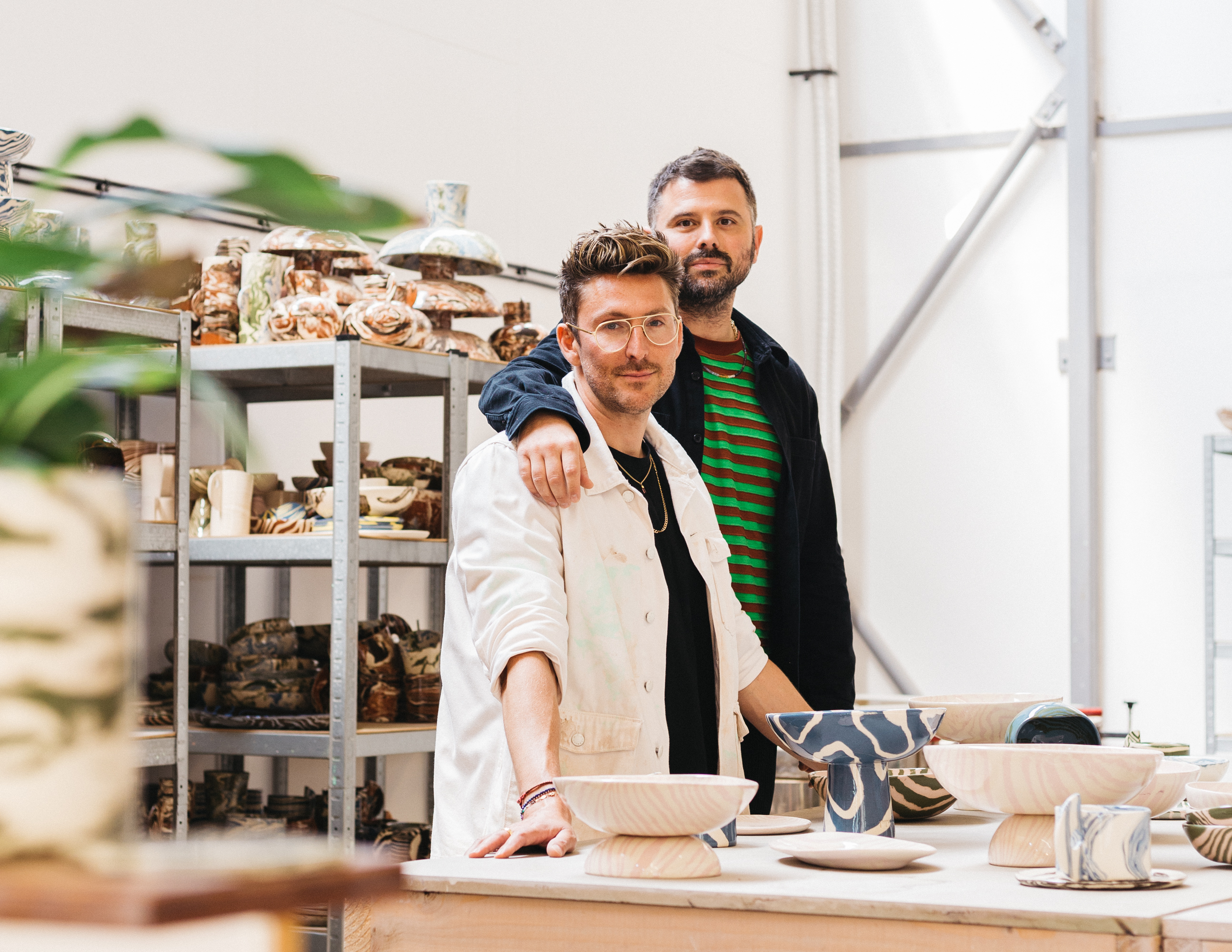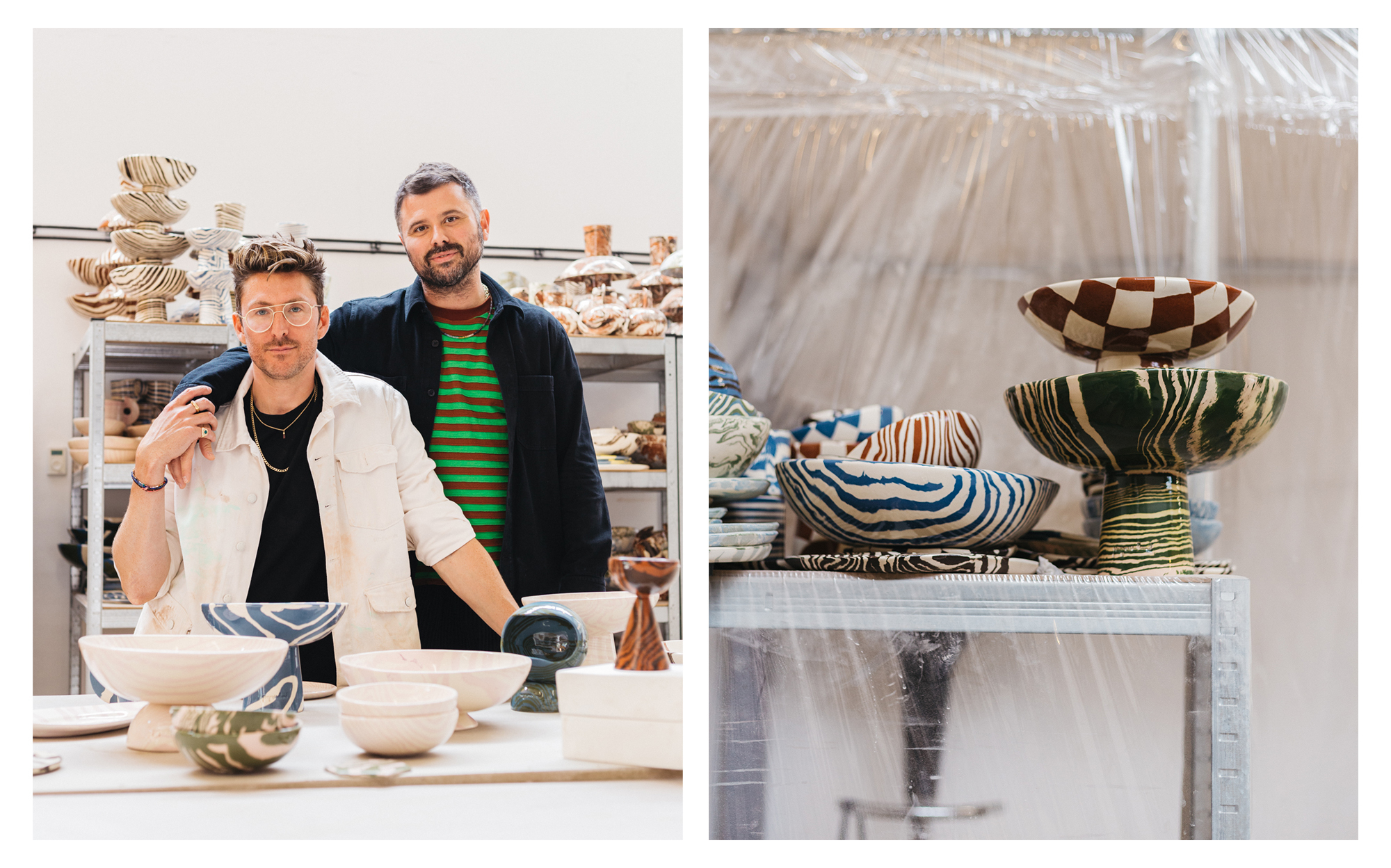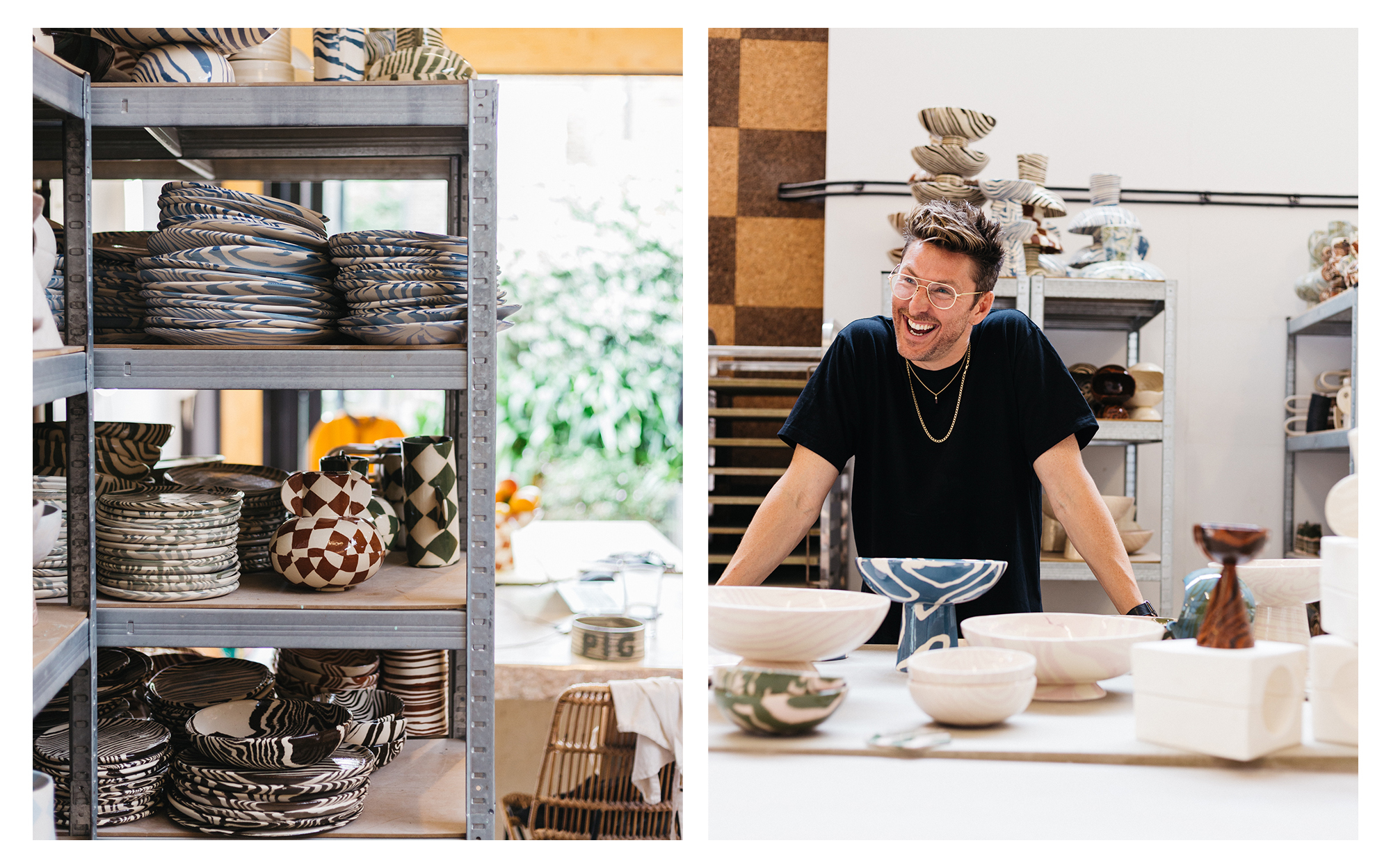
Words by Flora Macdonald Johnston
The first thing to note when speaking to Henry Holland and David Hodgson is that they don’t agree on everything. But, what they do agree on - is that in business, as a working husband duo, they work rather well. That’s not to say they never argue or have a heated debate on a dog walk, but in just two years they’ve created a now cult-like ceramics business, Henry Holland Studio.
Henry’s creations have become something of a phenomenon. He recently collaborated with British designer Paul Smith creating gigantic geometric lamps, vases and bowls in his now signature layered coloured clay. He is stocked at Liberty’s and Matches, and impressively, direct-to-consumer still makes up the majority of Henry Holland Studio’s business. In fact, they recently received their largest ever order from a member of a royal family, despite my best efforts, both manage to keep the mystery royal a secret.
When looking at a Henry Holland Studio piece, you quickly realise each bowl, plate, vase and lamp are all unique. Layers of coloured and neutral clay are thrown together (Nerikomi, a Japanese technique Henry taught himself) meaning each design comes out differently to the other, and the structures have an organic like quality to them. “People love to pick out their favourites when they see the pieces in person,” says Henry, “it’s all very tactile, they will pick up plate after plate until they’ve found the ones they like the best - and I love that.”
"I didn't quite understand or recognize just how much I would miss making things and having a creative output..."

Whilst it's easy to now focus on the brand’s quickly growing success, the origins of Henry Holland Studio started as quite the opposite. Henry’s eponymous fashion label went into administration after 13 years in 2020 as lockdown began, which left him feeling directionless and wondering - what’s next?
“I was planning to go into consulting and do more strategic stuff for people,” he tells me, “and then, I just didn't quite understand or recognize just how much I would miss making things and having a creative output. So I started having these ceramics lessons to kind of fulfill that need in the evenings. And then, as lockdown got more and more intense I ended up making pots in the kitchen. And, at that point, David was like, "can you keep it down?!”
Here, David quickly interjects; “I would be watching a lovely Christmas film and would hear Henry bashing on the kitchen table! Firstly, I was like you’re going to ruin my Christmas with this noise, and the dog is going mental, secondly, you’re going to ruin our lovely table! So either you pack this in or we do this properly.” And just like that, their business partnership began.
But just how quickly the business grew from bashing clay on an expensive kitchen table, they could not predict. Henry started posting his newly kilned creations on his personal Instagram account during lockdown, “and people just went nuts about it, and demanded to see more” says Henry.
The timing of this all in hindsight was serendipitous, homeware had a boom during the pandemic, retailer Heal’s published a report in 2022 stating that 22% of consumers focused on redecorating their homes during 2020, and the Financial Times reported that spending on household goods had increased by 3,000% in some cases from furniture and drinkware to candles and fragrances.
Whilst Henry can sit happily for hours and hours making his pots tucked away in his studio - to the point where David wondered if Henry was being unfaithful, (“one of the things we did with the collection which is rather great, is that we named all of our vases after famous affairs because of that,” says Henry with a laugh), David manages all operations and wholesale. His knack for business has been clear through his stint designing at Loewe, to his tenure as Creative Director at Lulu Guinness.
The next steps for the business are clear, Henry and David envisage a store which they hope to open later this year. The kind of store they see is still up for discussion. A space where art meets function? A gallery? A shop? A workshop with classes? All of these ideas are thrown together into conversation.
However, when asked why a physical store is so important for the brand when they have such a strong digital presence already, David is straight to the point. “It's just really nice to actually meet your customer, you can meet the people that are buying it and talk to them and they talk about the pieces that they already have and the piece they bought. I think with a physical store, consumers can enter your world and we can talk to them and we can have a real connection with who's buying it and what they are buying, and we want to learn more and want to be a part of their life more and help them build it. That's why we're building up the range with different products and expanding our product categories.”
"Websites are very good at being functional and transactional, but they're not as great as a store..."

To this Henry adds; “We want people to see the pieces and interact with them. I think it all feeds into each other. We launched the business on Instagram. I launched my last business on MySpace. So I've always had that sort of trajectory starting off in digital and moving into physical space. I think it's because I've never had the kind of confidence that I could instantly just go off and get stores. I've always had to focus on selling things directly myself, which I think is a really good viewpoint to start with. Websites are very good at being functional and transactional, but they're not as great as a store. You know, it's a trickier thing to build communities around brands just through a screen and social media.”
Their ambitions do not stop with a store in London, both see a brand that has stores across the world, especially in the US, which makes up a large amount of their market already. “I want to build a business that reflects the lifestyle that we want,” says Henry, “so, I would love to create this kind of globalized cottage industry where we can build studios in places we want to travel, sydney or LA. These would then facilitate localised fulfillment of orders. For example, our lamps are really successful in the US, and they cost thousands of pounds to ship over. But people still pay for it. To me, that's insane. So if we could create these small little studios like the one we have in London, but in these places around the world that we love to travel to all the while facilitating these local orders, and still keeping things small, that would be incredible. Imagine, a small team, a small group of artists who we could teach to make our products, so that we never lose that personal touch that people enjoy so much. It would just be amazing."
On working together? Both agree there is so much joy but there is hardship too; “My mum always said lose the battle, win the war,” says David, “ultimately, you have to learn to let go of things. And you need to have your eyes open, but it can be so rewarding.”
“I would definitely recommend working with your partner,” says Henry in response, “you’ve just got to really love that person and enjoy the highs and recognise there will be lows.” I finish our conversation saying that I feel I’ve led a therapy session to which both burst out laughing. Now, off to Henry Holland Studio's Instagram to scroll through delicious lamps…
